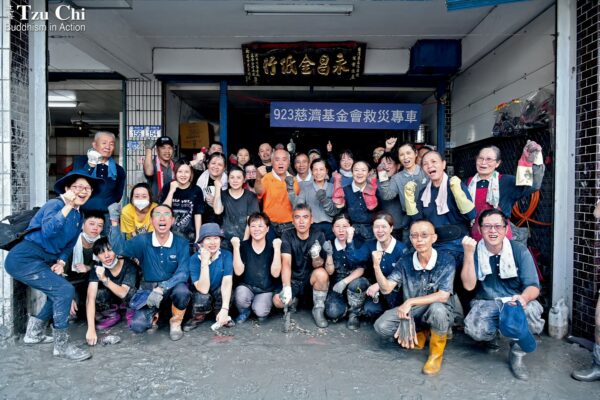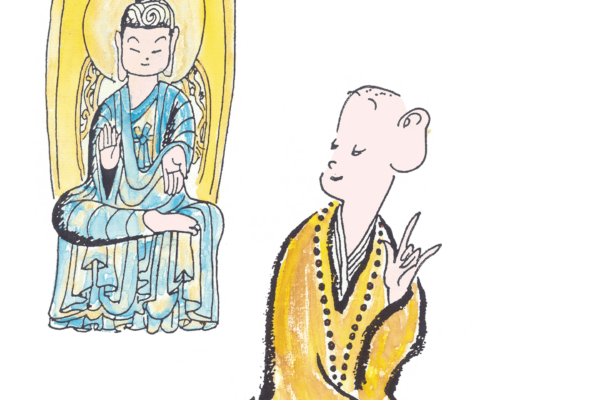Translated by Teresa Chang
I always keep my mentor Dharma Master Yin Shun in my heart and on my mind. When he accepted me as his disciple six decades ago, he instructed me to “work for Buddhism and for all living beings.” Those instructions have guided my life. I have taken care to ensure my life adheres to his teachings and the right principles.
The Buddha is also my mentor. Hundreds of years after the Enlightened One entered nirvana, wise and accomplished monks compiled his oral teachings into sutras. All sutras are rare and precious, containing profound wisdom and providing guidance for future generations on the path to overcoming worldly attachments and desires. I have expounded on several important Buddhist scriptures in my life, including the Sutra of Forty-Two Chapters, the Sutra on the Buddha’s Bequeathed Teachings, the Sutra of the Bodhisattvas’ Eight Realizations, the Lotus Sutra, the Medicine Buddha Sutra, and the Sutra of Innumerable Meanings. Among these, the Sutra of Innumerable Meanings, which is the essence of the Lotus Sutra, holds a special place with me. I’ve recited, transcribed, and expounded on the Lotus Sutra all my life. It contains the guiding principles I have steadfastly lived by.
Before I entered the monastic life, I overheard a devotee telling Dharma Master Xiu Dao at the Ci Yun Temple in Taichung about how a neighbor was renovating their house and had discovered a copy of the Lotus Sutra, consisting of seven volumes. No one knew how many generations it had survived. When I heard the name Lotus Sutra, my heart was filled with joy. The neighbor was planning to take it to an antique dealer, but I quickly asked if I could purchase it. That was 70 years ago. I kept that copy until its pages became loose when I flipped through it.
In 2020, I was given a hand-copied edition of the Koran by Faisal Hu (胡光中), a Tzu Chi volunteer in Türkiye. It was 500 years old, although its pages had suffered damage over time. The value of this precious scripture prompted me to take great care in its preservation, so I entrusted it to the National Taiwan Library for restoration. In June this year, they returned the sacred book to me, meticulously restored. I am grateful for modern technology, which has ensured its preservation for many more centuries to come.
The National Taiwan Library’s restoration work with the Koran showed exquisite craftsmanship and left me in awe. It filled me with great confidence in their skills. Therefore, I entrusted my old copy of the Lotus Sutra to them as well. I hope that it will be restored to good shape and can continue to be passed down through generations.
Living in an impure and troubled world, it feels as though we are traversing through a dark tunnel. Sacred religious texts serve as a guiding light, illuminating the path towards the radiance at the tunnel’s end. While religions bear different names, their underlying principles remain the same. Teachings that possess wisdom and can be shared with individuals of varying capacities are all worth propagating. No matter the religion, the promotion of virtuous actions that benefit humanity is of utmost importance.
Good teachings, kind words, virtuous actions, and benevolent intentions have the power to create blessings for humanity. Conversely, speaking ill words and sowing discord among people can disrupt society and even lead to conflicts between nations. If people’s minds are not peaceful and balanced, disharmony and unrest follow.
Unwholesome thoughts can turn friendly nations into warring foes, resulting in tragic death and the large-scale displacement of people. While achieving a world without illness or suffering may be impossible, attaining a state of peace without warfare is within our reach. It is impossible that humanity, all eight billion individuals, can share one mind and heart. However, we can still make a difference by starting with ourselves. I urge all Tzu Chi volunteers to inspire those with whom they have formed positive connections. By sharing kind words and stories of Tzu Chi with as many people as possible, we can encourage them to make noble aspirations and contribute to the welfare of humankind, working towards alleviating suffering in the world.
The biggest concern in my heart is witnessing people in need yet being unable to reach out and help them. They may have survived disasters, but still need assistance to get by. Reflecting upon their suffering and contemplating the multitude of individuals enduring hardships and hunger reinforces the importance of encouraging more people to go out into the world and make a positive impact. Let us be ever more mindful.

Sacred writings of any religion that promote kind words, virtuous actions, and benevolent intentions have the power to create blessings and peace for humanity.
Huang Xiao-zhe



